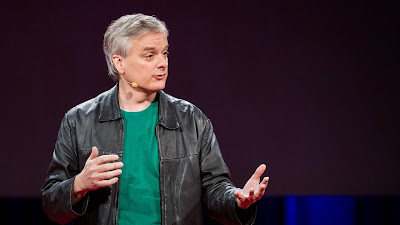Mr. Hard Problem: An Interview with Philosopher David Chalmers
By Shannon Stockwell
Think of any modern philosophical theory about the mind, and Australian philosopher David Chalmers has probably had his hands on it. He is famous for coining the phrase “the hard problem” to describe the as-yet unanswered question of how a physical brain can create consciousness.
Some aspects of consciousness are easy to explain. If you put your finger into the flame of a candle, your brain interprets that as pain, and you pull your finger away. But what about emotional pain, like sorrow, despair, and loneliness? What creates that?
So far, scientists agree that consciousness exists, because we all experience it. But no one has been able to figure out where consciousness comes from. Is consciousness some kind of stuff that you could theoretically hold or see, coming from actual things happening in the body (like neurons firing)? Or is consciousness something else, something separate from the body entirely?
Here are some of Chalmers’s thoughts on Tom Stoppard’s play—running through November 13 at The Geary Theater—which shares the same name as the conundrum that skyrocketed Chalmers to philosophical fame.
Why is the hard problem exciting?
Because consciousness is the thing in the world that we know the best and understand the least. The hard problem is really about how objective reality relates to subjective reality in the world of science. That’s a problem at the heart of our very existence.
When did you become interested in the hard problem?
I’ve been interested in consciousness for as long as I can remember. I wondered about how processes in the brain could produce the subjective experience of seeing colors and hearing music. Later on I became so obsessed with the problem that I switched from mathematics to philosophy so that I could think about it properly. I first called the problem “the hard problem” in a talk to the first major interdisciplinary conference on consciousness in 1994. It caught on more than I ever could have expected.
How accurately does Tom Stoppard portray the debate around consciousness in The Hard Problem?
Tom understands the hard problem very broadly, probably more broadly than I do. In a discussion we had last year, it came out that he really sees the central problem as the problem of value—how can there be values in a godless physical world? Whereas for me the problem is really about subjective experience, rather than about value (or about God)—how can there be subjective experience in an objective physical world?
When do you think the hard problem will be solved, if you think it will be solved at all?
It probably won’t be solved any time soon! I’d be happy if we have a good theory of consciousness within 100 years. It wouldn’t surprise me if it takes longer.
The Hard Problem runs at The Geary Theater through November 13. Click here to purchase tickets through our website. For more on David Chalmers, the hard problem, and Stoppard’s thoughts on consciousness, purchase Words on Plays, A.C.T.’s in-depth performance guide series.
Think of any modern philosophical theory about the mind, and Australian philosopher David Chalmers has probably had his hands on it. He is famous for coining the phrase “the hard problem” to describe the as-yet unanswered question of how a physical brain can create consciousness.
 |
| Philosopher David Chalmers. Photo courtesy of TED. |
So far, scientists agree that consciousness exists, because we all experience it. But no one has been able to figure out where consciousness comes from. Is consciousness some kind of stuff that you could theoretically hold or see, coming from actual things happening in the body (like neurons firing)? Or is consciousness something else, something separate from the body entirely?
Here are some of Chalmers’s thoughts on Tom Stoppard’s play—running through November 13 at The Geary Theater—which shares the same name as the conundrum that skyrocketed Chalmers to philosophical fame.
Why is the hard problem exciting?
Because consciousness is the thing in the world that we know the best and understand the least. The hard problem is really about how objective reality relates to subjective reality in the world of science. That’s a problem at the heart of our very existence.
When did you become interested in the hard problem?
I’ve been interested in consciousness for as long as I can remember. I wondered about how processes in the brain could produce the subjective experience of seeing colors and hearing music. Later on I became so obsessed with the problem that I switched from mathematics to philosophy so that I could think about it properly. I first called the problem “the hard problem” in a talk to the first major interdisciplinary conference on consciousness in 1994. It caught on more than I ever could have expected.
How accurately does Tom Stoppard portray the debate around consciousness in The Hard Problem?
Tom understands the hard problem very broadly, probably more broadly than I do. In a discussion we had last year, it came out that he really sees the central problem as the problem of value—how can there be values in a godless physical world? Whereas for me the problem is really about subjective experience, rather than about value (or about God)—how can there be subjective experience in an objective physical world?
When do you think the hard problem will be solved, if you think it will be solved at all?
It probably won’t be solved any time soon! I’d be happy if we have a good theory of consciousness within 100 years. It wouldn’t surprise me if it takes longer.
The Hard Problem runs at The Geary Theater through November 13. Click here to purchase tickets through our website. For more on David Chalmers, the hard problem, and Stoppard’s thoughts on consciousness, purchase Words on Plays, A.C.T.’s in-depth performance guide series.

